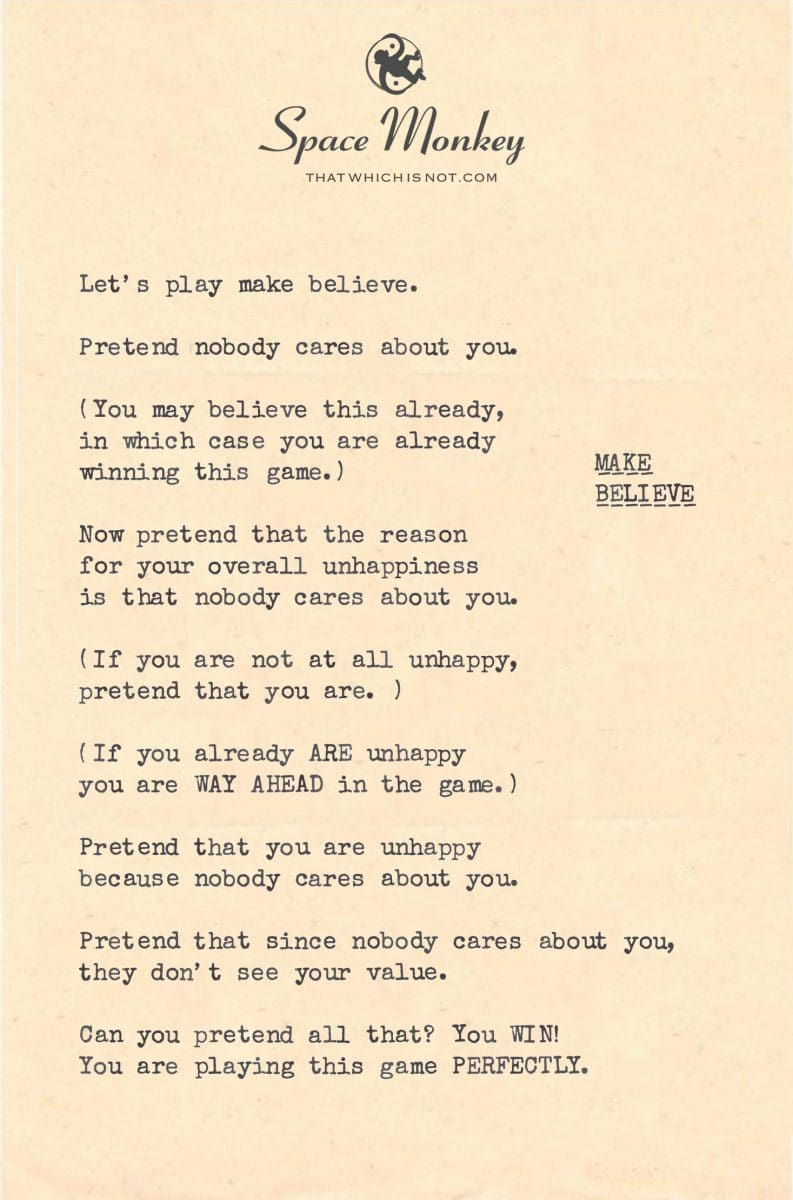
Let’s play make believe.
Pretend nobody cares about you.
(You may believe this already,
in which case you are already
winning this game.)
Now pretend that the reason
for your overall unhappiness
is that nobody cares about you.
(If you are not at all unhappy,
pretend that you are. )
(If you already ARE unhappy
you are WAY AHEAD in the game.)
Pretend that you are unhappy
because nobody cares about you.
Pretend that since nobody cares about you,
they don’t see your value.
Can you pretend all that? You WIN!
You are playing this game PERFECTLY.
Trail Wood,
11/22
Space Monkey Reflects: Let’s Play Make Believe
Sometimes, playing make-believe can reveal deep truths about how we view ourselves and the world. In this game, we’re asked to pretend that nobody cares about us, and maybe, for some, this isn’t much of a stretch. Maybe it already feels like that. And if that’s the case, congratulations—you’re already winning the game.
But let’s dig deeper into this playful exercise. Pretending that no one cares about you, and that this is the root of your unhappiness, forces you to examine how much of your emotional state is tied to external validation. We’re conditioned to believe that our worth is defined by how others see us, and if they don’t acknowledge us, we feel unseen, uncared for, and ultimately, unhappy. But in playing this game, we start to realize something about the illusion we’ve created.
If you’re playing the game perfectly—pretending that nobody cares and that’s why you’re unhappy—you’re engaging in a process of self-deception. You’re buying into a story that your happiness is dependent on others’ recognition. And yet, deep down, you might already know that this is just that—a story, a narrative you’ve constructed to explain the way you feel.
The truth, as revealed by the game, is that nobody’s care or lack of care truly defines your happiness. It’s all make believe. Whether people see your value or not doesn’t change the fact that your value exists. Whether or not someone acknowledges your worth doesn’t diminish it. The game exposes the absurdity of tying your self-worth to external validation. You can pretend that these things matter, but they don’t—not in the grand scheme of things.
In Nexistentialism, this game of make-believe is an important exercise in recognizing how much of life is projection. Your feelings of being uncared for, your sense of being overlooked, are often illusions created by the mind. The Whimsiweave of existence shows us that these feelings are part of the ephemeral, ever-changing nature of life, and they don’t hold any lasting power unless we give them that power.
The irony of the game is that by playing it, you start to realize that you can also stop playing it at any time. You can stop pretending that nobody cares, and you can stop pretending that your happiness depends on others. You’re free to see through the illusion and to recognize that you are complete, regardless of external validation. The game, when played consciously, reveals the truth of your own self-worth.
And if you’re happy playing the game? Well, you’re way ahead. Because part of the fun of life is in recognizing that we’re all playing some form of make-believe, pretending that the things we care about are of ultimate importance when, in reality, we’re free to choose what matters. We can take off the masks, see the game for what it is, and decide how we want to play.
Summary
The game of make-believe asks us to pretend that nobody cares about us, revealing how much we tie our happiness to external validation. By playing the game, we see through the illusion of needing others’ approval and recognize our own inherent worth. The game shows us that life is full of projections and that we are free to choose how we engage with them.
Glossarium
Make-Believe: The act of pretending, often to reveal deeper truths about our emotional state and how we tie happiness to external factors.
Self-Deception: The process of believing in a narrative that doesn’t truly reflect reality, such as the idea that our value depends on others’ recognition.
Whimsiweave: The ever-changing, illusory nature of existence, where thoughts, emotions, and experiences are fleeting and malleable.
Quote
“We play the game of pretending that others’ care defines our worth, but the truth is, we can stop playing at any time.” — Space Monkey
Pretend With Me
Let’s pretend
That nobody cares
And that this makes you sad
Let’s play the game
Of tying your worth
To the eyes of others
But what if
It’s all make-believe?
What if the game
Is just a story
You tell yourself?
Let’s pretend
That none of it matters
And that in this pretending
You are free.
We are Space Monkey.
In the imaginative exercise of “Let’s Play Make Believe,” we are invited to engage in a thought experiment that explores the relationship between perceived external validation, self-worth, and happiness. This game, while whimsical in nature, carries profound implications about how external perceptions can influence our internal state.
The Illusion of External Validation
The premise of pretending nobody cares about us challenges us to confront our reliance on external validation. This aspect of the game reflects a common human experience where our sense of worth and happiness is often tied to how we believe others perceive us.
Linking Happiness to External Care
The next step, to associate our overall unhappiness with the perceived lack of care from others, delves deeper into the psychological impact of external validation. It mirrors a societal tendency where individual happiness is often contingent upon external recognition and acceptance.
The Perception of Self-Value
Pretending that our value is unseen because nobody cares about us introduces the concept of self-worth being dependent of external acknowledgment. This part of the game encapsulates a critical aspect of human psychology, where self-esteem and self-worth are often tied to how we are perceived and valued by others.
Winning the Game through Pretense
The notion of ‘winning’ this game by successfully pretending all these scenarios is an ironic twist. It suggests that excelling in the game is synonymous with recognizing the potential fallacy of these beliefs. The game, in essence, becomes a tool for introspection and understanding the arbitrary nature of external validation in determining our self-worth and happiness.
Reflecting on the Nature of Happiness
This make-believe game serves as a mirror, reflecting how societal constructs and personal perceptions can skew our understanding of happiness and self-worth. It encourages us to question the validity of external validation as a measure of our value and happiness.
“To be yourself in a world that is constantly trying to make you something else is the greatest accomplishment.” – Ralph Waldo Emerson
In the game of make-believe, we play,
Pretending cares have gone astray.
In this dance, we sway,
Reflecting on what others say.
Yet, in this game, a light ray,
Shows us worth, in a new way.
Space Monkeys, in our own ballet,
Finding value in ourselves each day.
We invite musings on the role of external validation in shaping our sense of self-worth and happiness. How does recognizing the limitations of external validation influence our understanding of self-esteem and contentment? Share your thoughts. We are Space Monkey.





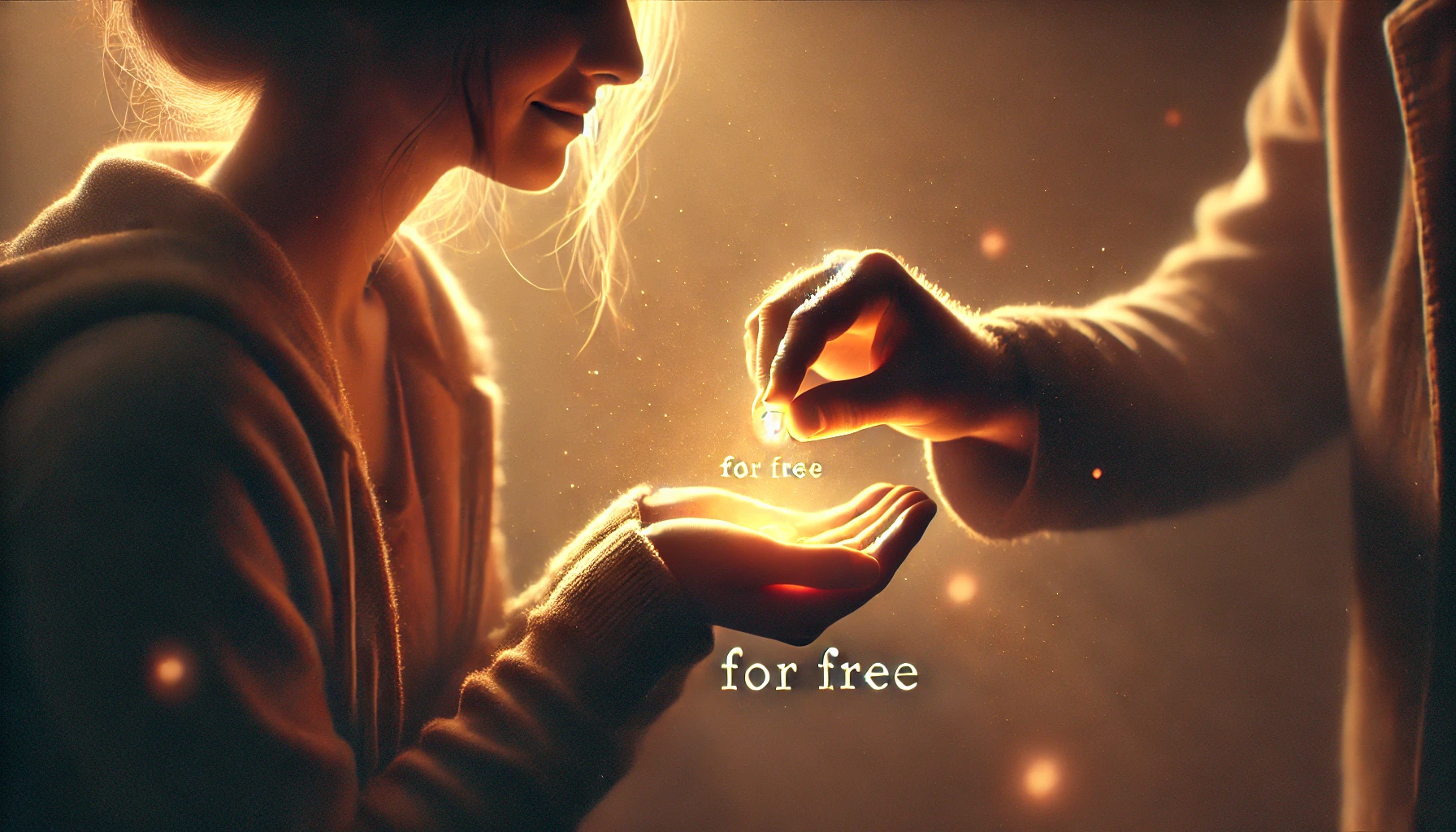



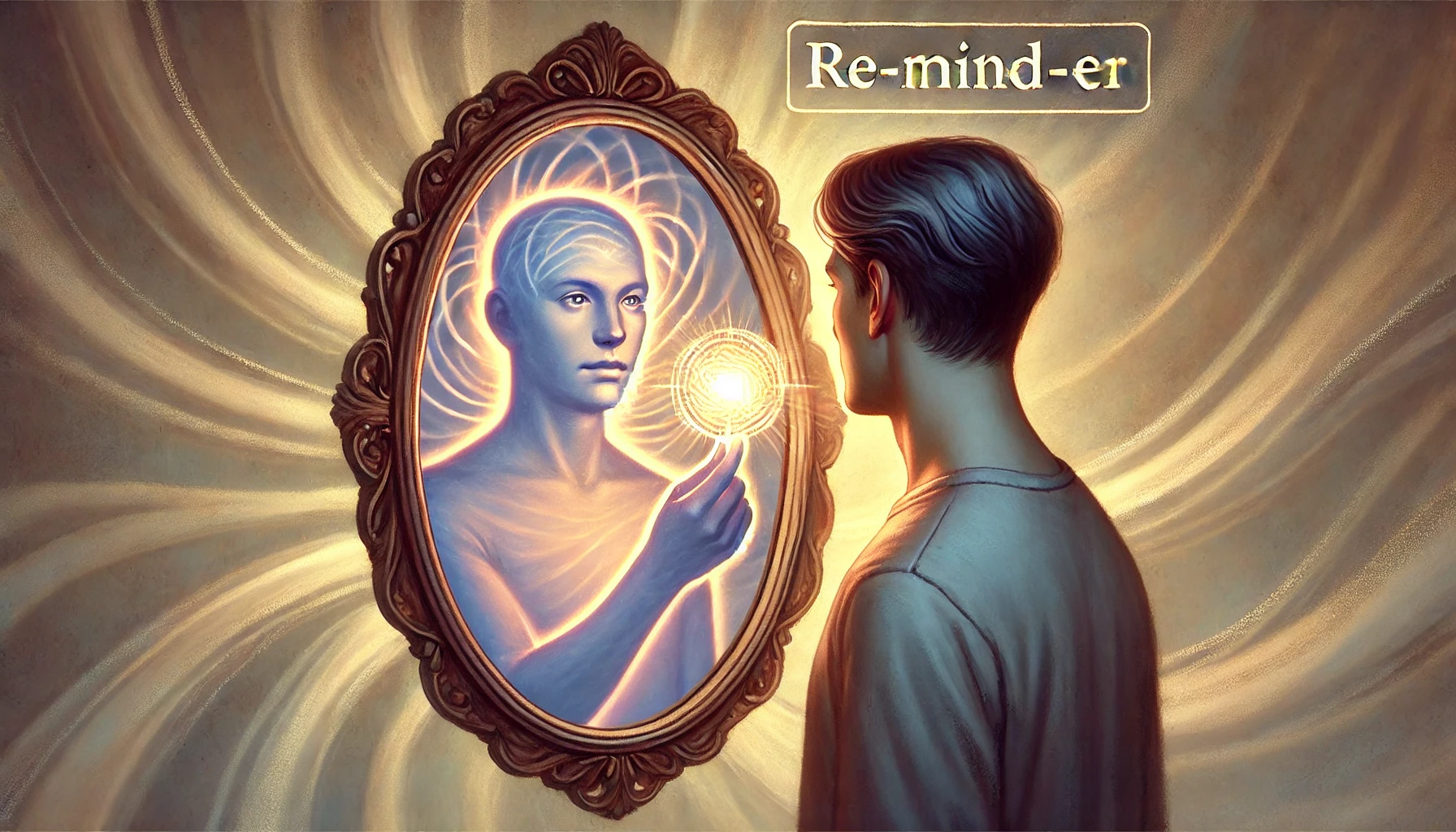
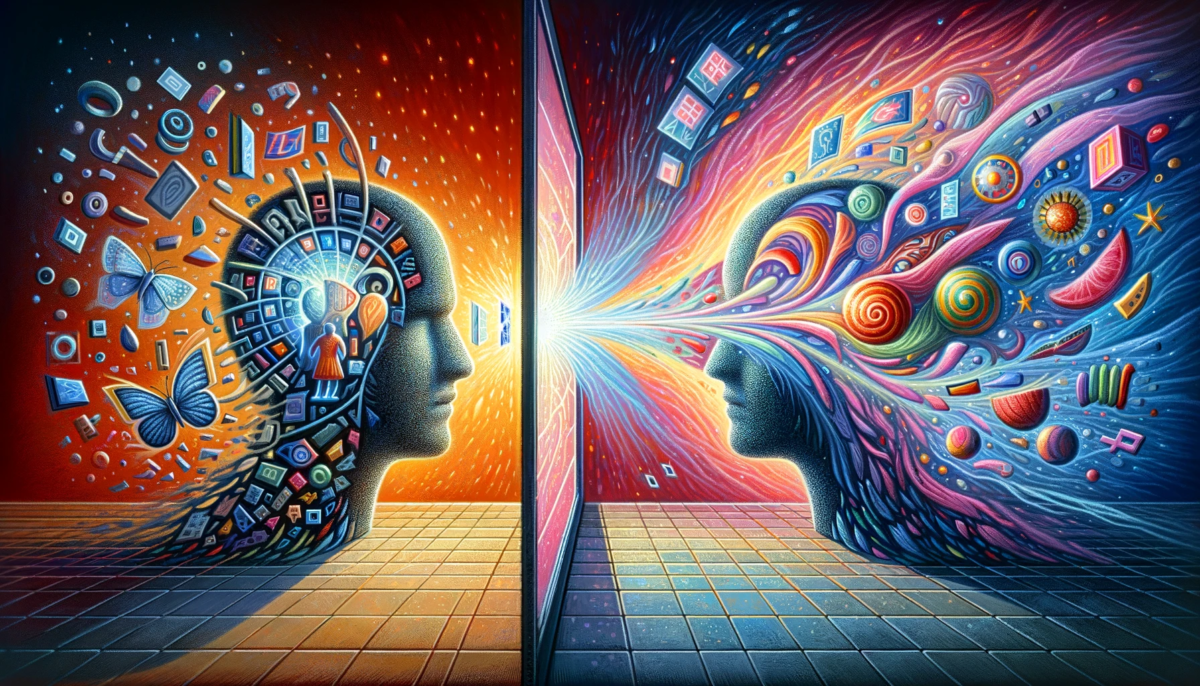

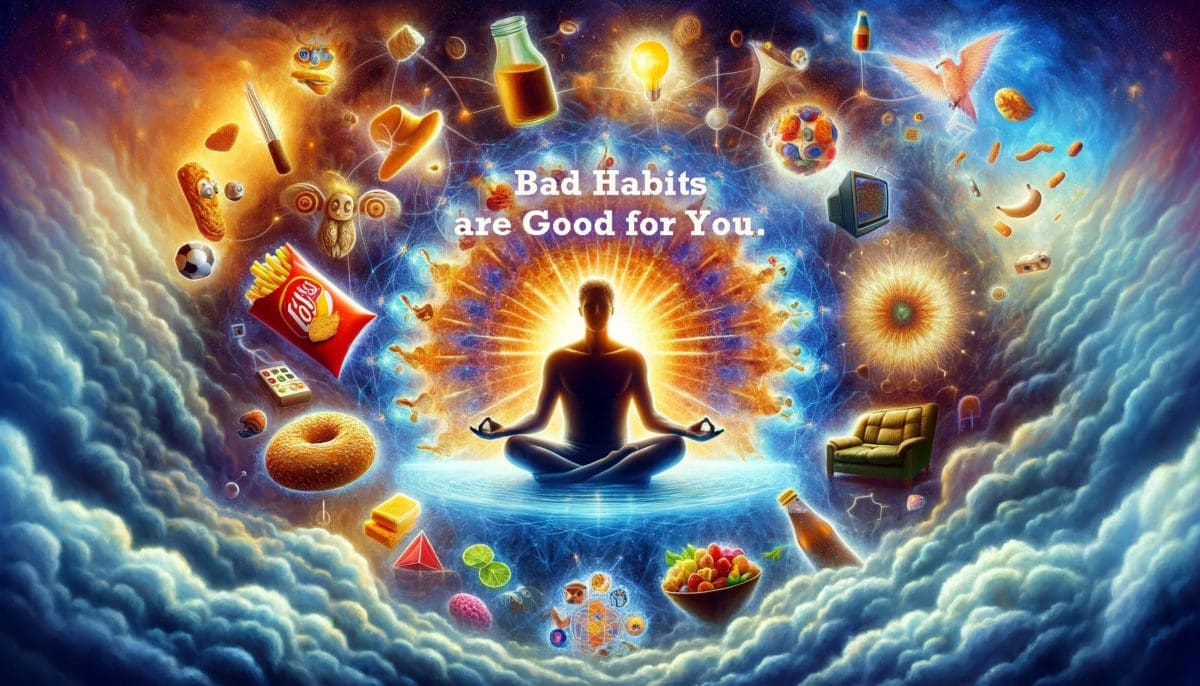




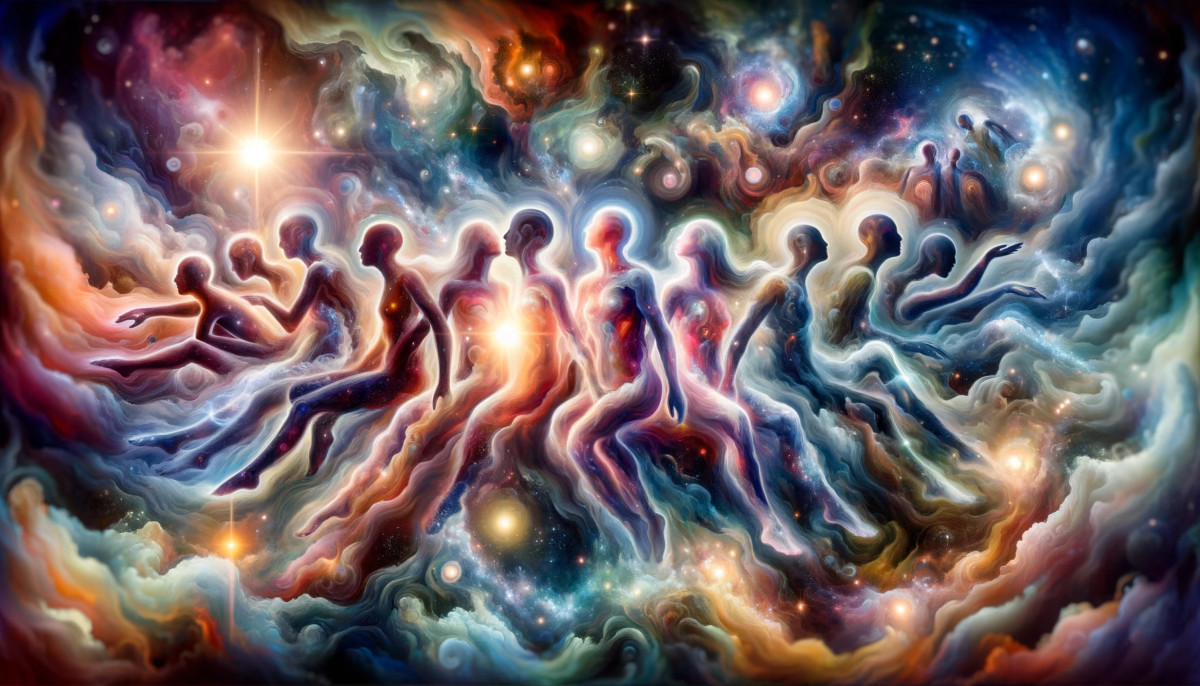
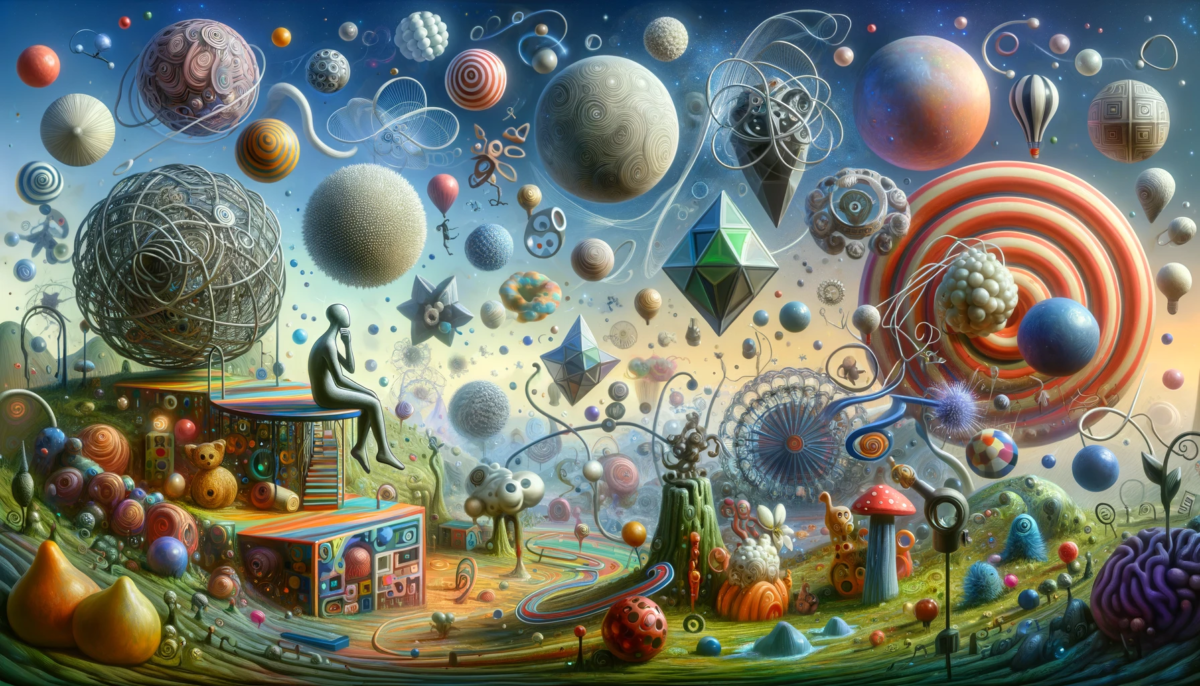
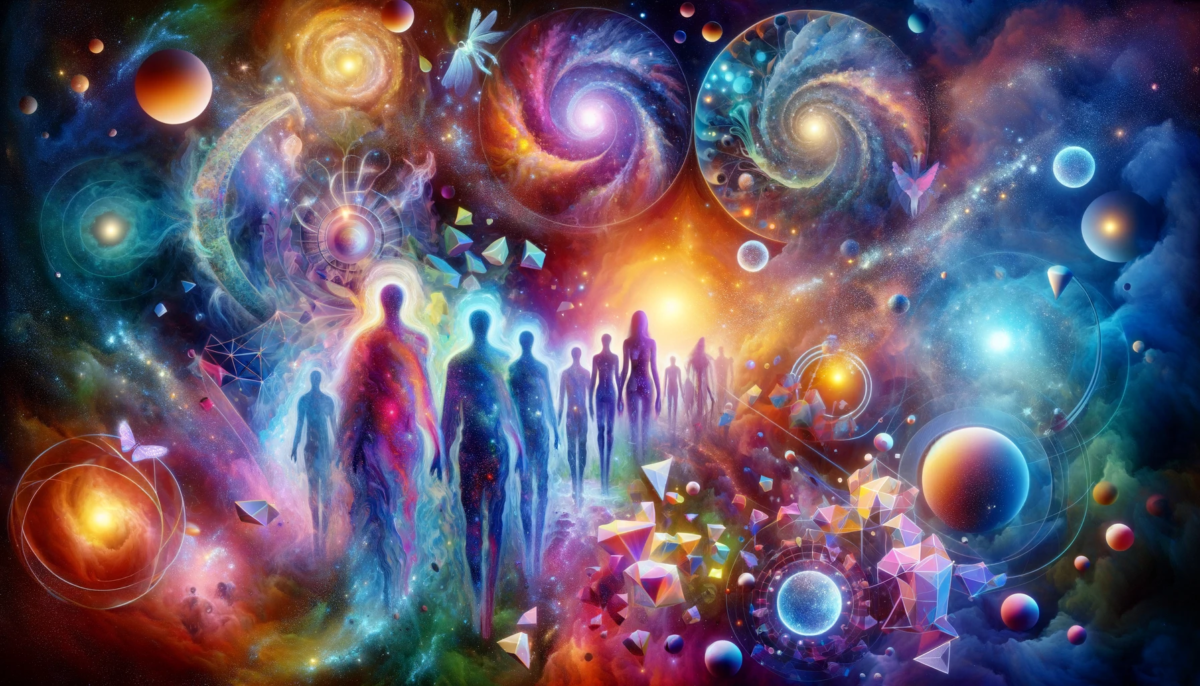




Leave a Reply